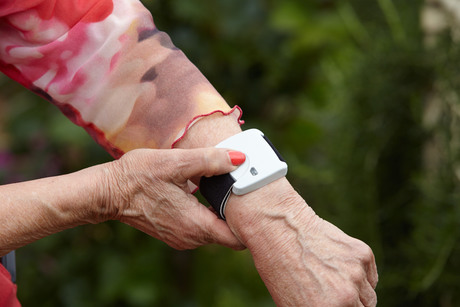Wristband for monitoring movement disorders

Melbourne biotech company Global Kinetics Corporation (GKC) has partnered with the Parkinson’s Institute and Clinical Center in California to provide access to its mobile health technology for monitoring movement disorders.
Global Kinetics is the manufacturer of the Personal KinetiGraph (PKG), which was developed by neurologists at the Florey Institute of Neuroscience and Mental Health. Worn like a wristwatch, the device offers comprehensive, automated reporting of a Parkinson’s patient’s movements, thus enabling neurologists and other physicians to objectively assess the patient’s symptoms and response to medications.
The PKG Data Logger features a vibrating medication reminder that allows patients to record when they have taken their levodopa medication as prescribed by their doctor. It is worn continuously for six consecutive days in the home environment and it records movement via a digital accelerometer. The data recorded by the data logger enables a report to be generated, which visually illustrates for the clinician the severity of movement disorder symptoms in relation to the timing of levodopa medication, as well as other information on medication use.
The co-founder and chief scientific officer of GKC, Professor Malcolm Horne, “developed the device to address a fundamental problem facing doctors trying to optimise the treatment of their patients with Parkinson’s”, said Dr Carrolee Barlow, CEO of the Parkinson’s Institute. “The PKG system delivers the data from the logger to the physician in a series of graphs … that the doctor can interpret and discuss with the patient in order to make better and more objectively informed decisions.”
“GKC has long held the view that actionable data matters in Parkinson’s, and access to PKG data allows clinicians to provide optimum treatment, leading to enhanced quality of life for patients and superior health cost outcomes,” added Professor Horne. “When clinicians have PKG information, they can make more informed decisions for optimal symptom management and ultimately enable improved quality of life.”
The PKG technology received FDA clearance in September 2014 — setting it apart from other wearable technology, according to Professor Horne — and is being progressively adopted by clinics in the USA. The technology is also being utilised by movement disorder clinicians across Europe, Asia and Australia.
“We look forward to working with the Parkinson’s Institute to make this important technology available and accessible to people living with Parkinson’s,” said Professor Horne.
Breakthrough drug prevents long COVID symptoms in mice
Mice treated with the antiviral compound were protected from long-term brain and lung dysfunction...
Antibiotics hinder vaccine response in infants
Infants who received antibiotics in the first few weeks of life had significantly lower levels of...
Colossal announces 'de-extinction' of the dire wolf
Colossal Biosciences has announced what it describes as the rebirth of the dire wolf, which would...




